The Foundation Programme is a unique interdisciplinary core offered to the Undergraduate Programmes at Ahmedabad University. All the students entering the University’s Undergraduate Programmes go through the eighteen-week common core Foundation Programme that builds the foundations of citizenship and sustainable living and enables students to engage with issues of society. The programme is a distinctive pedagogical experiment offering transformative, transdisciplinary and contextual learning by integrating six domains of Knowledge as Constitution and Civilisation, Behaviour, Biology and Life, Materials, Data, and Communication. It effectively provides students, not only a platform for skill-building, research, training in critical thinking, and leadership but also offers a guide to becoming the agents of change in society through active ownership and participation, perspective building and collaborative cognition.
The objective of this new age programme is to cultivate a new generation of thinkers, problem solvers, and 21st-century professionals who are empowered with a more open, balanced and pragmatic approach towards life and work, who can decode the complexities of the recent world and put the knowledge earned into action. The programme aims to pave the way for an empowered and sustainable society with a promise to become a beacon of inspiration for the higher education institutions attempting to offer transformative education to students.

Communication
Communication can be acknowledged as one of the most critical transdisciplinary knowledge domains of the 21st century. The ability to communicate effectively is believed to have a profound impact on the professional as well as personal development of an individual. In the closely interconnected landscape of our times, the responsibility of leaders and other professionals to deal with complex and grand real-world challenges can only be met with training in effective communication at all levels to achieve the desired goals. Every initiative and innovation of our world today and tomorrow will have to integrate a well-defined communication strategy into its plan to not only successfully navigate through complex challenges and successful implementation but also to meet sustainable and continuous growth. Ahmedabad University aims to foster an intellectual and interactive learning environment for its students by integrating the communication domain as one of the core domains/competencies of its programmes. Communication as one of the six domains constituting the Foundation Programme thematic Studios indicates that Ahmedabad University recognises the domain as not only a necessary academic domain but an empowering tool to meet 21st-century work and society.
Data Science
Data is the new gold in the current era with its ability to offer meaningful insights into the society we live in and the grand challenges it encounters. In this interconnected world, the growth of individuals, organisations, multi-billion corporations, institutions, and countries is intertwined with their ability to extract meaningful and actionable insights from Big Data. Artificial intelligence (AI) and Machine learning (ML), a subset of AI, the new world buzzwords, are nothing more than a few lines of code if they are not trained with meaningful data. Ahmedabad University’s focus on transdisciplinary contextual learning through Foundation Programme thematic Studios integrates data science as one of the key domains for students. The students of today, and the leaders of tomorrow, must be equipped with the perspectives and insights that this learning domain has to offer so that they can contribute through active participation and effective, ethical decision-making when they encounter the grand challenges of our times.

Constitution and Civilisation
The Constitution, whether written or unwritten, not only asserts the sovereignty of a nation-state but also conveys a promise to its citizens. The Constitution and Civilisation domain emphasises the contextual specificity of Constitutions, with a particular focus on the history and transformations of the Indian constitution. The Constitution is a living document and the transformations/amendments in the Constitution reflect the dynamic aspirations that shape civilisations. Through a thoughtful engagement with the history of the Indian constitution via the constituent assembly debates, this domain instils an appreciation for the challenging task of drafting a constitution that was capable of reflecting the hopes and concerns of a remarkably diverse citizenry. The domain attends to the lived experiences of democratic citizenship and how everyday citizens call upon the Constitution to ensure the accountability of governments. The domain also invites us to engage with the challenges that dominate the Anthropocene which are critical for ecological civilisation. What kind of development and urbanisation do we need? How can we ensure that neighbourhoods are cognizant of their interwoven past and ready for a sustainable future? Students explore such questions through readings, field visits, and other highly interactive learning experiences.

Behaviour
In the modern times of the 21st century, the field of behaviour has assumed higher significance as a knowledge area for empowering students and learners in various aspects of life. Understanding behaviour and its nuances encompasses not only the field of psychology and behaviour but also extends to aspects such as citizenship, sustainable development, meta-learning, inclusivity, and problem-solving. Behavioural knowledge enables learners to understand the role of becoming and developing responsible citizens. It promotes a deep understanding of societal norms, ethics, and civic engagement. This includes understanding sustainable development goals and related behaviour patterns such as responsible consumption and environmental conservation. This contributes to a more ecologically conscious society. Understanding and appreciating that diversity exists in individual and group behavioural traits of people allows for the development of empathy and supports inclusive environments. With the interdisciplinary approach of the foundation programme, the identification of intersections of the various domains with behaviour helps students become more effective through conceptual thinking and lifelong learning.

Biology and Life
Why is it important to study relationships between humans and ecosystems, nature and sustainability? Is the knowledge domain of biology and life sciences transforming our world in ways beyond our understanding and knowledge? How is biology as a discipline enriching itself by intertwining with other disciplines and becoming more of an interdisciplinary phenomenon? Can biology prove helpful to address decimating bio-diversity, feeding an explosive global population, treating diseases which seem incurable till now or even living sustainably? Cutting-edge research on stem cells, artificial organs, gene therapy for rare disorders to personalised genomes and even genetically modifying crops provide hope in mitigating problems in medicine, food and conservation. Biology in today's world is truly interdisciplinary and thus a crucial area of study in the Foundation Programme curriculum. As the world struggles to tackle pandemics like coronavirus and the dramatic effects of rapid climate change, biological insights could certainly help mitigate some of the crises we face today. The Foundation program therefore integrates biology as a central domain through which one could more closely associate with other faculties e.g. humanities for a holistic understanding of our environment.

Materials
Materials have played a pivotal role in the growth and sustenance of civilisations, across the globe, in the past. In the 21st century, technological advancements have taken humans or human-made objects to the Moon, Mars, asteroids and beyond, all centred around the success of synthesising new materials. Some materials are critical to our very existence, while others, when overexploited, have the potential to derail economies or decimate civilisations. In the current era of exponential technological advancements, the know-how of materials plays a critical role. Materials hold the key to economic, scientific, and social growth in the present world order. Whether it is governance, technology, quantum computers, medical science or households, materials have an important and central role to play. The work and society of tomorrow need a deeper understanding of the materials in order to cope with the fast-paced changes and transformations. Foundation Programme Studios are designed keeping in mind the domains of knowledge that offer the directions to lead and guide the present and future generation thinkers. Our curriculums must not only offer the knowledge but also the wisdom that, going forward, sustainable usage or exploitation of these materials will define the course of climate change and its impact on present civilisations and their future growth.
These six knowledge domains of the programme aim to define the areas of advanced research and innovation that are transforming our world and offer students the contemporary academic and life skills essential in the 21st century. These Domains provide the scaffolding for contextual interdisciplinary learning in a way that by the end of the programme, a student is not only exposed to the Domain-related learning but can demonstrate an understanding of the relevant global concerns and ways to address them individually as well as collectively.
The domains are delivered through studio-type immersive and intensive thematic courses to develop a holistic approach to thinking and enquiry amongst our students. Students do four such Studios in a year and each of these Studios follows a 4 weeks-modules format where apart from concepts and theories on domains, the application of the same is realised through daily, week-long, individual, and group activities, projects, and interactive sessions.
The Foundation Programme offers four thematic Studios such as -
Water | Environment and Climate Change | Democracy and Justice | Neighbourhoods
These thematic Studios are carefully chosen in order to engage the student’s imagination with contemporary problems that the society in which they live encounters. Each of these Studios requires students to interact with the local community and gain insights into their concerns related to the themes of the Programme and in turn, work on collaborative class projects to devise a feasible approach to address the same. The Programme’s integration of theoretical, critical, global and local perspectives to understand contemporary concerns allows students to display a deeper understanding of real-life society and contribute through social service.
The Foundation Programme is unique in many ways. The unconventional design not only facilitates students with exposure to real-world global concerns but enables them to engage and actively participate in the cause with the help of invited speakers who bring global and local initiatives, industry perspectives and a rich range of experience and exposure to the classrooms.

SAMIR SHAH
Managing Partner
Peak Sustainability Ventures
Designed by a diverse group of faculty as part of the Foundation Program at Ahmedabad University, the Water Studio illustrates the urgency of looking at water from an interdisciplinary, inclusive and ethical lens. Through practical examples, contextualised frameworks, field-visits, case studies and multimedia analysis, the month-long program builds sensitivity and leadership in our youth as future water stewards.

SARA AHMED
IISER-Pune
Founder, Living Waters Museum
Democracy has emerged as the most desirable, the most legitimate and the most just if not the most successful, form of government in the contemporary world. The Foundation Programme Studio on Democracy and Justice revolves around the fundamental questions contextualising democracy, understanding the nature and value of democratic systems and conversations, and enabling students to be responsible citizens.
Environment and Climate Change
Human activities and its consequences such as depleting and unequal access to resources, climate extremes, food insecurity, pollution, ecosystem degradation, extinction of species and many more, have posed challenges of sustainability that span spatial and temporal scales. The Studio on Environment and climate change facilitates discourse on these issues enabling students to take the charge, act, and play their role as agents of sustainable transformation.
The Studio Neighbourhoods dwells upon the continuously evolving idea of the neighbourhood. The Studio explores ways of understanding the concept of neighbourhood in geographic, historical, cultural,economic and social perspectives. It also enriches students’ understanding of aspects of governance, biodiversity, lifestyle and health profile of neighbourhood.
Studio Water has been designed to study water through an interdisciplinary approach, facilitating a multi-dimensional understanding of this vital flow resource. The Studio offers a close opportunity to students to not only engage in understanding various aspects of water but also to interact with ‘self’ and ‘communities’ in order to appreciate the water realities.
A studio is a unique pedagogic tool to teach students interdisciplinary topics and skills.
The Foundation Programme at Ahmedabad University is delivered via four diverse studios. A studio is a unique pedagogic tool to teach students interdisciplinary topics and skills. The key characteristics that make studios a unique learning pedagogy than the traditional lecture format are learning by doing (hands-on), doing things simultaneously (and not sequentially), an iterative approach that entails refining outputs with each iteration, much higher peer-to-peer learning, and most importantly, it embodies the muddling through approach, wherein outcomes/targets are defined, but the path is not. Depending on the context the paths can be different, leading to the same/similar outcomes. The Democracy and Justice Studio, that I was involved in, presented a unique opportunity to deliver various domain knowledge via three modules, with the last module designed to converge learning in the three modules into a coherent output. Here, students chose a topic that they were most passionate about and prepared a critical paper. Overall, they learnt the skills of building arguments supported by evidence from data analysis, articulating them in a clear and succinct textual narrative, visualising data to produce impactful graphics, verbal presentation skills, and teamwork. It is rather impossible to deliver such a wide spectrum of knowledge and skills via the lecture format of teaching.
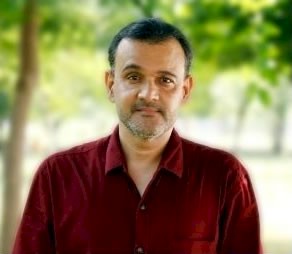
Bhargav Adhvaryu
Professor, Amrut Mody School of Management
Foundation Programme, a brave new world
I started working on the Foundation Programme in March 2018, as the Convenor of a team of 12 faculty members from various disciplines. At this stage what we were working towards was a 1-month long ‘pilot’ course on the theme of “Democracy and Justice”. Creatively and analytically, this was a brave new world. It involved bringing together many disciplinary vantage points in 4 modules, each engaging with the broad themes of democracy and justice in the contemporary world, and encouraging the practice of certain skills such as those of communications or data analysis. My focus at this juncture was on isolating a clear structure for the course, starting with ideas of democracy in the first week, understanding the role of human rights in democracy (but via an emphasis on bodily and reproductive rights, which engaged the biological and life sciences domain) in the second, a week of quantitative analyses of case studies of democracy in the world and finally a last week in which all the learnings of the previous 3 modules could be applied. Initially, this took the form of a mock election, in which students were asked to evolve political manifestos for a fictional political party. They were encouraged to create mock social media campaigns and present their understanding of democratic needs in manifestos in a live public fair at the end of the semester. On the basis of spectator votes, a party was announced as winner at the end of the day. In later versions of the course, we transitioned away from the idea of a mock election as it seemed to place too much emphasis on the personal charisma of the ‘candidate’ and of members of the political party. In the subsequent semester-long versions of this course, we introduced two new activities for the fourth week (i.e., the last module of the course which related to citizen rights and the virtues of democratic conversation). In the first iteration, I suggested that each faculty member mentor two groups of students and guide their readings in preparation for a larger public debate and written position paper, where one side would debate the ‘pros’ and the other the ‘cons’ of a motion. Together, we came up with contemporary and controversial debate topics like the suitability of reservation by economic background rather than by caste in India, Section 370 (the abrogation of Kashmir’s autonomy and special status in the Indian constitution), and the death penalty. Student groups were asked to present their positions (with the aid of appealing audio-visual presentations). Finally, we settled on the most dynamic form of this activity in the form of a mock “talk show”, where each side created a show on which a host of characters, representing different stakeholders in society, entered the stage and advocated for a ‘pro’ or ‘con’ position. Students responded very creatively with this assignment, they had to research and develop their ‘roles’ according to readings and questions we gave them beforehand. They went all out in terms of costumes, music and dialogue. And they worked in teams to represent all the angles in one position (say from a lawyer, a civilian, a human rights activist, a politician) and staged very powerful debates.
I originally developed the talk show for Module 2 in which students participated in similar role play for debates relating to bodily and reproductive rights (covering topics like genetic engineering, abortion, surrogacy and sex determination). Seeing the creative flair and understanding that students brought to this exercise, we decided to replicate it on a larger scale for the final module of the course. Additionally, in Module 2 students were asked to compare different systems of government in the world and represent their commentary in the form of political cartoons. Needless to say, this generated a lot of original visual representations of the features of various political regimes as well as discussion about their relative merits, including the limits of democracies. Allowing students to tap into their imagination, I’ve found, is actually a very effective way to get them to think, feel, and ultimately, find the courage to share their views with others.
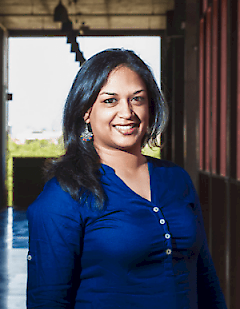
Aparajita Basu
Assistant Professor, School of Arts and Sciences
After the teaching experience at the Foundation Programme, I know what an interdisciplinary classroom looks like
When I first heard of the Foundation Programme, I was excited by the idea of interdisciplinary studios. I recall taking some great courses in prestigious institutions within India and abroad when I was a student, but cannot recall taking courses such as these. However, on becoming a Foundation Programme faculty in one of its four studios, I could not help but think, how will this work in the classroom? What would a class with two faculty from two completely different academic disciplines look like? In my case, it was me, an Arts faculty (working within the broad area of Indian History) co-teaching with a Sciences faculty (working within the broad area of Ecology) in Module 3 of the ‘Neighbourhoods’ studio. Though I was enthusiastic to start teaching in it, not having seen this type of classroom before, I had some trouble visualising it.
To my joy, what I found in my experience of our virtual classroom, was something that I could not have imagined before. Without going into details, I’ll give a quick example here: while we were (still are) in the grip of the COVID-19 pandemic, our studio faculty promptly decided to incorporate this pandemic into the course. In our module, among other things, we had a component on Public Health where we aimed to demonstrate to our students (through the domains of Constitution and Civilisation and Biology and Life Sciences) how matters in the current health crisis are really interconnected and have to be viewed from multiple disciplinary perspectives in order to achieve a somewhat rounded understanding. While teaching, I noticed that my co-faculty and I were engaging in an academic dialogue quite naturally, which I much enjoyed, and I sincerely hope that students have benefitted from our conversations. Such dialogues between different disciplines (wherever possible) in order to understand any major contemporary problem (case in point here being COVID-19) is one of the ways in which we want our students to start thinking, of course, along with specializing in their specific areas of study.
After this teaching experience, I know what an interdisciplinary classroom looks like (even if it is on Zoom), how useful it might be for students to have such an integrated learning experience, and more importantly, why this synthesis of knowledge is necessary in the fast-changing world that we are living in. I’m writing this piece for anyone who believes in staying within the firm contours of their own disciplinary interests to solve issues and to say to them that if one gave such courses a try, they would perhaps, see it for themselves how it all comes together this way while approaching real-life problems.
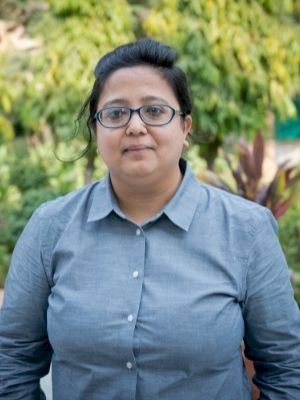
Manomohini Dutta
Assistant Professor, School of Arts and Sciences
Delivering the Foundation Programme online
My stint in the Foundation Programme began in February 2019. I have always taught in the studio “Environment and Climate Change”. I have witnessed sea changes in terms of a larger pool of faculty involved compared to when I joined and continuous revision and refinement of our course outlines.
The experience of teaching in the Foundation Programme changed in a big way when we moved online in April 2020. Everybody knows that and needs no elaboration. What was more interesting was when whole separate course outlines had to be designed for online delivery for each of the four Studios. There had to be two outlines: one for the hoping-against-hope offline delivery mode as before, but with small modifications in content and activities to meet the interests of the insatiable students, and another, the best-we-can-do online delivery course outline (nothing short of extraordinary as this literally was a heart and soul effort of all the faculty involved). These changes were rolled out in Monsoon Semester 2020 and continued in Winter Semester 2021.
I enjoyed teaching in the fully online version in Winter 2021 having Professor Anjan Sen, a physicist, as my partner. In contrast, I am an economist, for the record. One of the major changes from teaching in the offline mode was the pace and sequence at which we were delivering our lectures. Both of us also tried our best to quote current figures and data on the topic being presented. Discussions were held with a large number of students. This also meant that students seemed more interested and felt more responsible for doing in-class and afternoon activities.
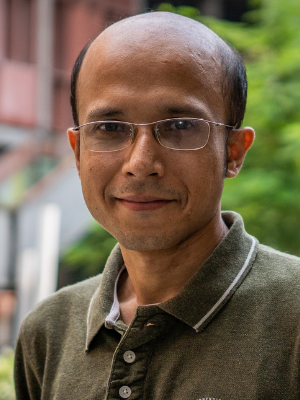
Supratim Das Gupta
Assistant Professor, Amrut Mody School of Management
Foundation Programme encourages a positive engagement of students in the Studios to relate the classroom concepts with real-life problems
Foundation Programme encourages a positive engagement of students in the Studios to relate the classroom concepts with real-life problems. It not only facilitates the students with active learning and problem solving but also allows them to interact with the community, understand them, and collect and analyse the relevant data to relate it with the societal issues. In Water Studio of the Programme, Clean Water and its Safety through Citizen Science was the approach used to map the quality of water by assessing the biological and chemical contaminants of water that was collected by the students from different wards of Ahmedabad. Students learned about the chemical and biological characteristics of water and the kind of diseases which are water-based. A prototype for different types of filters was also made by the students as a part of the Water Studio, which offered a hands-on learning experience to the students. The Foundation Programme Studios are designed to offer interdisciplinary learning to the students. While students explored the city collecting the groundwater and the municipality supplied water for quality assessment, they were made to realise a few important aspects around water. They could relate water with gender when they observed that women and girls are mainly responsible for the collection of water for household purposes irrespective of their physique and illness. They could see how the burden of the collection of water wherever it is not available on the premises, has affected and caused harm to one gender in the area of health and hygiene, education, and overall growth. This has made them aware and informed citizens and has changed their thinking and behaviour.
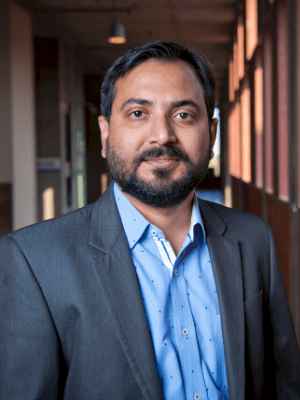
Ashutosh Kumar
Associate Professor, School of Arts and Sciences
My journey through the Foundation Programme has been both amazing as well as transformative. I had a myopic view of the disciplines and believed that learning my subjects well was enough to handle any challenge I would encounter. But the four studios of the Foundation Programme, i.e. Environment and Climate Change, Democracy and Justice, Neighborhoods and Water, forced me to think hard and take a holistic view of every problem and seek out innovative solutions by broadening my perspective. It made me understand how just a bucket of water creates a complex impact on gender roles in society, forcing me to open my mind while seeking a solution.

Prajwal Chatterjee
Bachelor of Arts (Honours)
What thrilled me the most were the classroom vibes!
As soon as you enter your first year, you are welcomed with a set of Foundation Programme Studios that change your perspective on how you see things. The studio on Democracy and Justice was a social mirror shown to the students as responsible citizens without sugar-coating or hiding sensitive elements, helping us experience the gentle side of democracy while pacing to dreadful corners as well. The studio is truly interdisciplinary in nature and the unique thing you'll experience here is that minds from different backgrounds were put together in a single classroom and sessions naturally led to intense discussions covering many aspects of the subject. What thrilled me the most was the palpable excitement in the classroom: brainstorming with peers and understanding aspects of democracy that we would never encounter in a typical civics classroom, if it were not for this studio. I am grateful to the teachers who made this experience a wonderful one. I believe every citizen deserves to get a glimpse of this mirror to make this world a place that humanity always deserved.

Charmi Monani
Integrated Master Of Business Administration
A learning process, well-rounded, unorthodox and unique!
For the incoming batch of 2020-21, we had an unusual year ahead of us as we were supposed to see our university, campus, peers, and faculty only virtually. Yet, with Ahmedabad University, it never felt like we are missing out on our learning experience. I never expected to be a part of such a well-rounded learning process which was completely unorthodox and unique. The unconventional ways of learning at the Foundation Programme touched upon issues that were of utmost importance and relevance in the present scenario but are generally not covered in most higher education curriculums. The programme helped me shape my thoughts and allowed me to work on enhancing significant skills and building perspectives, while interacting with fellow students and faculty. It was one of the most exceptional and enriching learning experiences that I ever had.
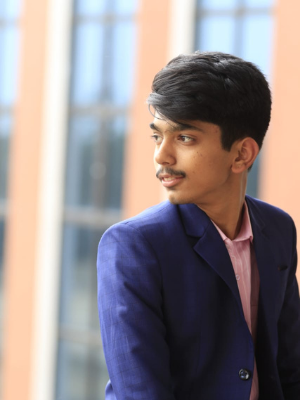
Adwait Waghmare
Bachelor of Arts (Honours)